16 start with D start with D
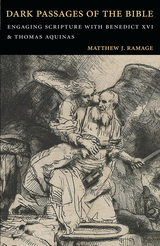

Romantic writers had found in Christianity a poetic cult of the imagination, an assertion of the spiritual quality of beauty in an age of vulgar materialism. The decadents, a diverse movement of writers, were the climax and exhaustion of this romantic tradition. In their art, they enacted the romance of faith as a protest against the dreariness of modern life. Ellis Hanson teases out two strands--eroticism and aestheticism--that rendered the decadent interest in Catholicism extraordinary. More than any other literary movement, the decadents explored the powerful historical relationship between homoeroticism and Roman Catholicism. Why, throughout history, have so many homosexuals been attracted to Catholic institutions that vociferously condemn homosexuality? This perplexing question is pursued in this elegant and innovative book.
Late-nineteenth-century aesthetes found in the Church a peculiar language that gave them a means of artistic and sexual expression. The brilliant cast of characters that parades through this book includes Oscar Wilde, Charles Baudelaire, J.-K. Huysmans, Walter Pater, and Paul Verlaine. Art for these writers was a mystical and erotic experience. In decadent Catholicism we can glimpse the beginnings of a postmodern valorization of perversity and performativity. Catholicism offered both the hysterical symptom and the last hope for paganism amid the dullness of Victorian puritanism and bourgeois materialism.

This monumental two-volume publication brings together in the original languages and an English translation, all the decrees of all the ecumenical councils from Nicaea I to Vatican II. As such it represents an indispensable reference work for theologians and historians, as well as for anyone interested in the development of Christian thought and doctrine. Indeed, these decrees represent the authoritative distillation of Christian tradition which itself is bound together with scripture "in a close and reciprocal relationship" so that the two "form a single sacred deposit of the word of God, entrusted to the church."
The original text is a reproduction of the brilliant edition by G. Alberigo and others of the decrees Conciliorum Oecumenicorum Decreta, which provides for the first time a reliable critical text for all the ecumenical councils. The English translation faces each page of the original text and is the first rendering into English of all these decrees taken together. The translators have used inclusive language throughout to emphasize the continuity of conciliar documents.
The 2,528 total pages of these two volumes include all the authenticated texts and their English renderings as well as a preface and introduction by the oringinal languages editor, a foreword by the English language editor, a bibliography for each decree, various commentaries and explanatory notes, and ten comprehensive indices.

Volume one of this two-volume set includes the decrees of the ecumenical councils from Nicaea I to Lateran V. Indispensable to both Roman Catholic and Protestant historians and theologians, as well as anyone interested in the development of Christian thought and doctrine, this volume presents the decrees in their original language and in English translation. These decrees represent the authoritative distillation of Christian tradition which itself is bound together with scripture "in a close and reciprocal relationship" so that the two "form a single sacred deposit of the word of God, entrusted to the church." The original text is a reproduction of the brilliant edition by G. Alberigo and others of the decrees Conciliorum Oecumenicorum Decreta, which provides for the first time a reliable critical text for all the ecumenical councils. The English translation faces each page of the original text and is the first rendering into English of all these decrees taken together. The translators have used inclusive language throughout to emphasize the continuity of conciliar documents.
This volume includes authenticated texts and their English renderings for the first eighteen councils as well as a preface and introduction by the original languages editor, a foreword by the English language editor, a bibliography for each decree, and various commentaries and explanatory notes.

Through the centuries, at the heart of Catholic moral theology is a fundamental question: How do we behave responsibly in the face of moral uncertainty? Attempts to resolve problems of everyday life led to the growth of a variety of moral systems, one of which emerged in the early 17th century and was known as "probabilism." This method of solving difficult moral cases allowed the believer to rely upon a view that was judged defensible in terms of its arguments or the authorities behind it, even if the opposite opinion was supported by stronger arguments or more authorities. The theologian Juan Caramuel, a Spanish Cistercian monk whom Alphonso Liguori famously characterized as "the prince of laxists," has been regarded as one of the more extreme—and notorious—proponents of probabilism. As the only full-length English study of Caramuel's theological method, Defending Probabilism seeks to reappraise Caramuel's legacy, claiming that his model of moral thinking, if better understood, can actually be of help to the Church today.
Considered one of the most erudite theologians of his age, a scientist and scholar who published works on everything from astronomy and architecture to printing and Gregorian chant, Caramuel strove throughout his life to understand probabilism's theological and philosophical foundations as part of his broader analysis of the nature of human knowledge.
In applying Caramuel's legacy to our own time, Defending Probabilism calls for a reconsideration of the value of provisional moral knowledge. Fleming's study shows that history matters, and that to attain any position on moral certitude is a difficult and painstaking process.
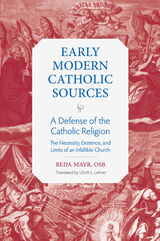
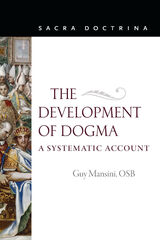
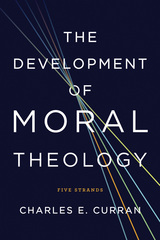
Charles Curran in his newest book The Development of Moral Theology: Five Strands, brings a unique historical and critical analysis to the five strands that differentiate Catholic moral theology from other approaches to Christian ethics—sin and the manuals of moral theology, the teaching of Thomas Aquinas and later Thomists, natural law, the role of authoritative church teaching in moral areas, and Vatican II. Significant changes have occurred over the course of these historical developments. In addition, pluralism and diversity exist even today, as illustrated, for example, in the theory of natural law proposed by Cardinal Ratzinger.
In light of these realities, Curran proposes his understanding of how the strands should influence moral theology today. A concluding chapter highlights the need for a truly theological approach and calls for a significant change in the way that the papal teaching office functions today and its understanding of natural law.
In a work useful to anyone who studies Catholic moral theology, The Development of Moral Theology underscores, in the light of the historical development of these strands, the importance of a truly theological and critical approach to moral theology that has significant ramifications for the life of the Catholic church.

The essays take up a variety of episodes from modern European and American history and explore, from various angles, three interrelated themes: 'public religion', and the role of Catholicism as a determined critic of modernity; religion as an impetus for innovation; and the tendency to reduce religion to culture.

From advance planning to advice on bridging the return from the twenty-four week retreat to everyday life, this Director's Guide provides assistance to those organizing Ignatian retreats based on James W. Skehan's Place Me with Your Son and those wishing to deepen the previous retreat experience. This volume explains the foundations of each phase of the retreat and suggests ways to prepare for the transitions between the phases. Skehan reviews the basic concepts; anticipates problems and opportunities that may arise in each week; offers possible responses to exercitants' questions; and interprets Scriptural passages for modern readers. The Guide also includes a list of recommended supplemental readings and guidelines for integrating the retreat into the liturgical year.
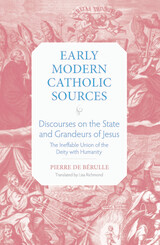
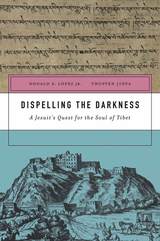
In a remote Himalayan village in 1721, the Jesuit priest Ippolito Desideri awaited permission from Rome to continue his mission to convert the Tibetan people to Christianity. In the meantime, he forged ahead with an ambitious project: a treatise, written in classical Tibetan, that would refute key Buddhist doctrines. If he could convince the Buddhist monks that these doctrines were false, thought Desideri, he would dispel the darkness of idolatry from Tibet.
Offering a fascinating glimpse into the historical encounter between Christianity and Buddhism, Dispelling the Darkness brings Desideri’s Tibetan writings to readers of English for the first time. This authoritative study provides extended excerpts from Inquiry concerning the Doctrines of Previous Lives and Emptiness, Desideri’s unfinished masterpiece, as well as a full translation of Essence of the Christian Religion, a companion work that broadens his refutation of Buddhism. Desideri possessed an unusually sophisticated understanding of Buddhism and a masterful command of the classical Tibetan language. He believed that only careful argumentation could demolish the philosophical foundations of Buddhism, especially the doctrines of rebirth and emptiness that prevented belief in the existence of God. Donald Lopez and Thupten Jinpa’s detailed commentary reveals how Desideri deftly used Tibetan literary conventions and passages from Buddhist scriptures to make his case.
When the Vatican refused Desideri’s petition, he returned to Rome, his manuscripts in tow, where they languished unread in archives. Dispelling the Darkness brings these vital texts to light after centuries of neglect.

In Charles E. Curran’s latest book, Diverse Voices in Modern US Moral Theology, he presents the diverse voices of US Catholic moral theologians from the mid-twentieth century to the present. The book discusses eleven key individuals in the development and evolution of moral theology as well as the New Wine, New Wineskins movement. This diversity, which differs from the monolithic understanding of moral theology that prevailed until recently, comes from the diverse historical circumstances or Sitz im Leben of the authors. Each of these theologians developed her or his approach in light of these circumstances and in response to shifts in the three audiences of moral theology—the Church, the academy, and the broader society.
By exploring this diversity, Curran recognizes the deep divisions that exist within Catholic moral theology between the so-called “liberal” and “conservative” approaches and acknowledges the need for greater dialogue between them, providing a deeper understanding of the methods and approaches of these significant figures.
This new book from a major figure in the field will be an important resource for students and scholars of US Catholic moral theology and for anyone seeking to understand the current state of moral theology in America today.
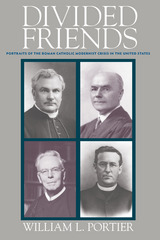
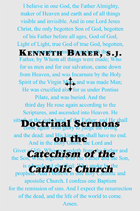
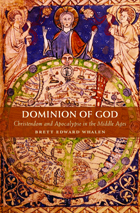
Brett Whalen explores the compelling belief that Christendom would spread to every corner of the earth before the end of time. During the High Middle Ages—an era of crusade, mission, and European expansion—the Western followers of Rome imagined the future conversion of Jews, Muslims, pagans, and Eastern Christians into one fold of God’s people, assembled under the authority of the Roman Church.
Starting with the eleventh-century papal reform, Whalen shows how theological readings of history, prophecies, and apocalyptic scenarios enabled medieval churchmen to project the authority of Rome over the world. Looking to Byzantium, the Islamic world, and beyond, Western Christians claimed their special place in the divine plan for salvation, whether they were battling for Jerusalem or preaching to unbelievers. For those who knew how to read the signs, history pointed toward the triumph and spread of Roman Christianity.
Yet this dream of Christendom raised troublesome questions about the problem of sin within the body of the faithful. By the late thirteenth and fourteenth centuries, radical apocalyptic thinkers numbered among the papacy’s most outspoken critics, who associated present-day ecclesiastical institutions with the evil of Antichrist—a subversive reading of the future. For such critics, the conversion of the world would happen only after the purgation of the Roman Church and a time of suffering for the true followers of God.
This engaging and beautifully written book offers an important window onto Western religious views in the past that continue to haunt modern times.
READERS
Browse our collection.
PUBLISHERS
See BiblioVault's publisher services.
STUDENT SERVICES
Files for college accessibility offices.
UChicago Accessibility Resources
home | accessibility | search | about | contact us
BiblioVault ® 2001 - 2024
The University of Chicago Press









